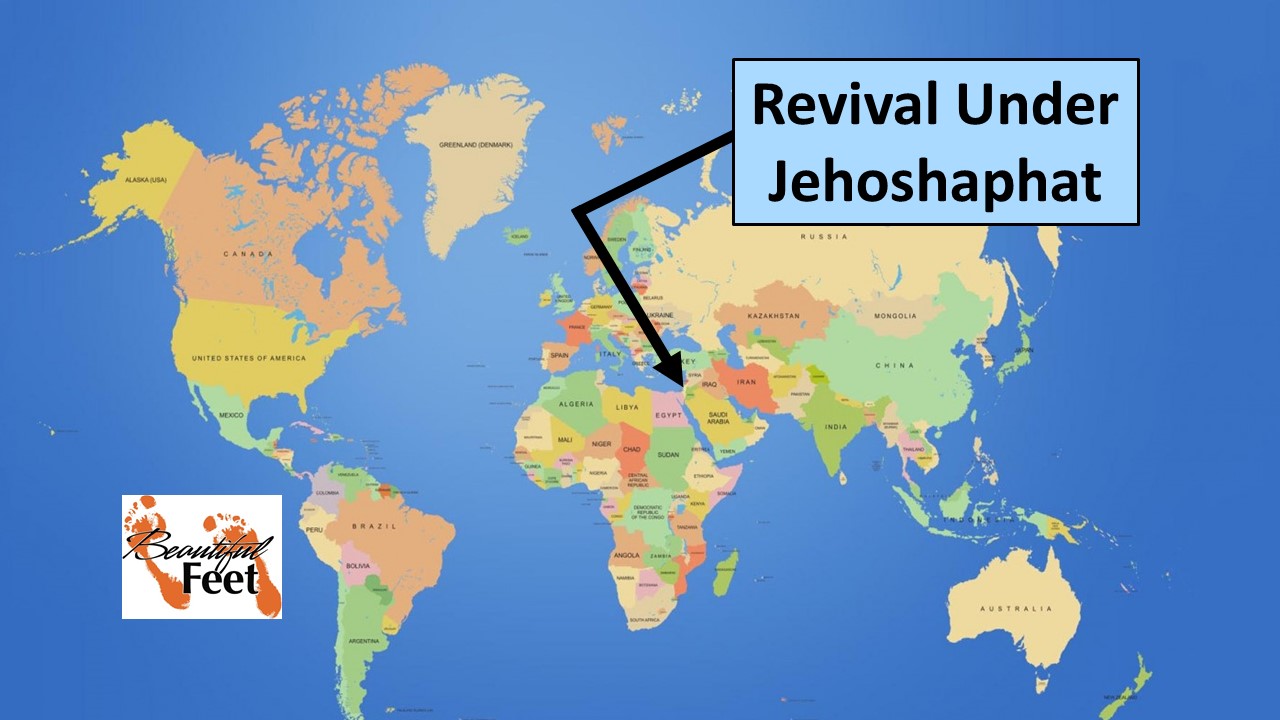
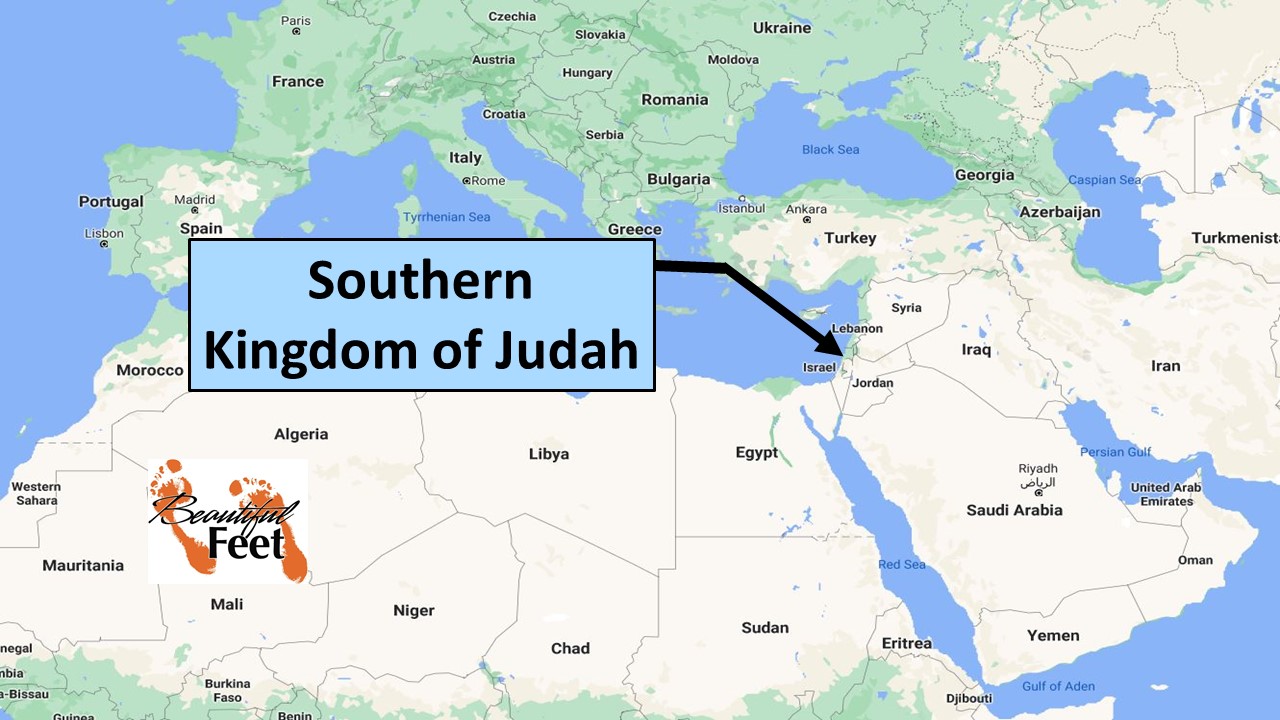
Introduction
King Jehoshaphat was the son of the godly King Asa, who led the nation of Judah out of idolatry and back to worshipping God at the temple. You can read about Asa’s revival with this link.
Having a godly father who set a good example, Jehoshaphat maintained his devotion to God throughout his lifetime, and that brought him God’s favor and protection, and the same came to the entire nation of Judah (2 Chronicles 17:3).
At the end of King Asa’s reign there were military skirmishes with the northern Kingdom of Israel (2 Chronicles 16:1). Because of these lingering conflicts, the first thing King Jehoshaphat had to focus on when he came to the throne was border fortifications (2 Chronicles 17:1-2).
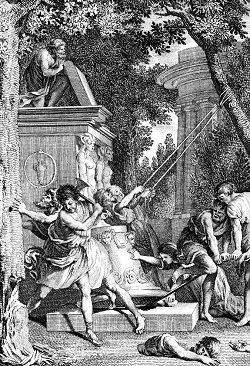
Destruction of Idols
Continual Fight against Encroaching Idolatry
The idolatry that was prevalent throughout the region had the potential to keep creeping back into the lives of the people, even though King Asa had fought hard against it. Jehoshaphat continued that work, and took action to destroy all forms of idolatry, specifically the Asherah poles (2 Chronicles 17:6).
Traveling Ministry Teams
In the third year of his reign Jehoshaphat started a traveling school. The faculty consisted of 16 well-trained men who would travel throughout the land teaching the law of the Lord (2 Chronicles 17:7-9).
Revival—A Silent, Unseen Influence
Because of Jehoshaphat’s devotion to the Lord, the continual effort to remove idolatry, and teaching the people the law of the Lord, God’s favor came upon him and his kingdom, with these results:
► The fear of God fell on surrounding nations, causing them not to consider war with him (2 Chronicles 17:10).
► The traditional enemies of Israel and Judah, the Philistines, brought him gifts and silver as tribute. The Arabs did the same by bringing him 7,700 rams and 7,700 goats (2 Chronicles 17:11).
► Military security was greatly enhanced with the building of fortresses throughout the land (2 Chronicles 17:12-13)
► His ground troops numbered 1,160,000, not including those stationed in fortified towns throughout Judah (2 Chronicles 17:14-19).
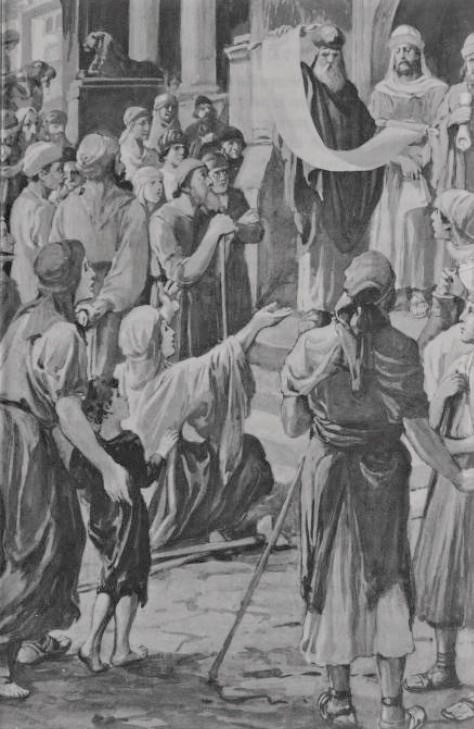
Traveling Teachers: 2 Chronicles 17:7-9
Jehoshaphat’s Second Revival
Jehoshaphat knew that idolatry was a very powerful force, continually trying to regain ground, so in 2 Chronicles 19:4 we see this godly king traveling from the southernmost part of his kingdom, Beersheba, to the northernmost (hill country of Ephraim), “encouraging the people to return to the Lord, the God of their ancestors.”
Knowing God favors a people who are honest in business and in measuring out justice, King Jehoshaphat introduced the following reforms:
► He appointed judges in every major city (2 Chronicles 19:5).
► He took precautions against judicial corruption (2 Chronicles 19:6-11).
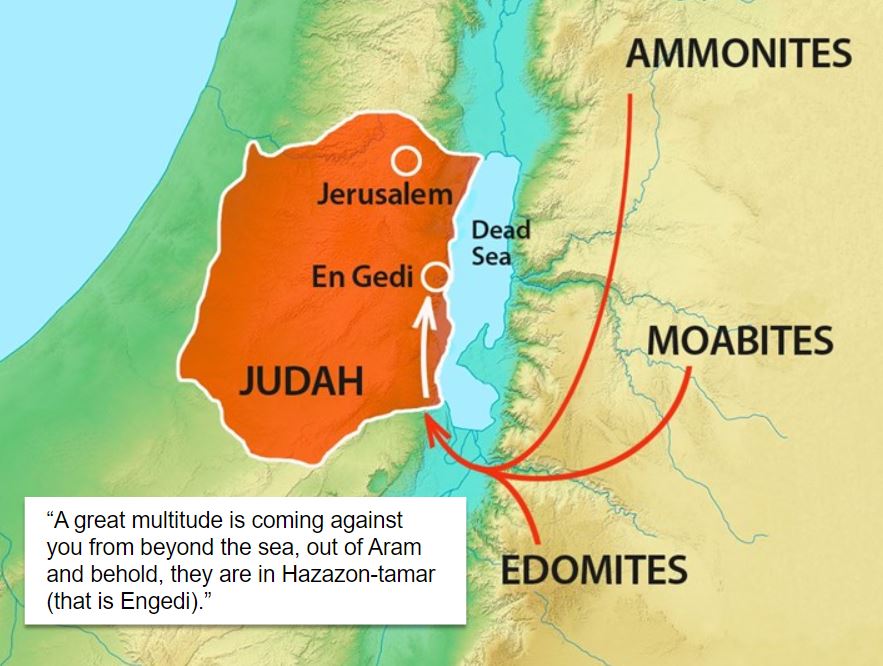
Path taken by the Ammonites, Moabites, and Edomites (Meunites)
Invasion by Massive Armies
When intelligence reports came to Jehoshaphat, informing him of three approaching armies, made up of Moab, Ammon, and the Meunites (Edomites/Mt. Seir), he knew he was up against insurmountable odds (2 Chronicles 20:1-2).
Far outnumbered, and with the Kingdom of Judah unprepared, Jehoshaphat did the only thing he could do, and that was call for a national day of prayer. This involved bringing the entire populace to Jerusalem to humble themselves in prayer and fasting (2 Chronicles 20:3-4).
Jehoshaphat’s prayer was possibly the most sincere and desperate plea anyone could make in such a situation:
We do not know what to do, but we are looking to you for help (2 Chronicles 20:12).
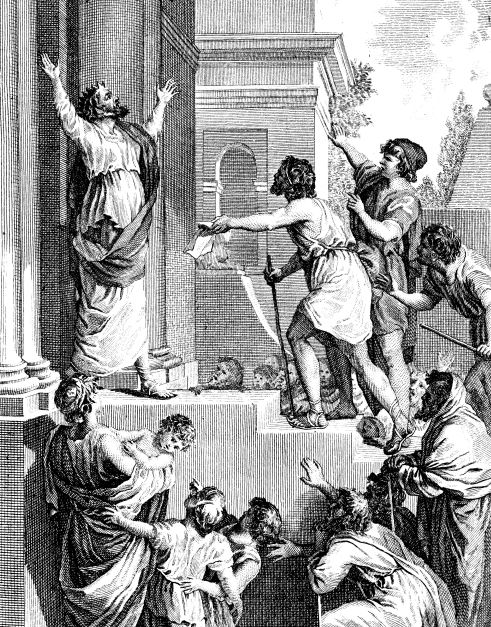
Prayer of Jehoshaphat
The Prophet Speaks
When the men of Judah were assembled, “with their little ones, wives, and children” (2 Chronicles 20:13), the prophet Jahaziel, spoke, and being the mouthpiece of God, said:
► Do not be afraid!
► Don’t be discouraged.
► The battle is not yours, but Gods.
► Tomorrow, march out against them.
► You will not even need to fight.
► Stand still and watch the Lord’s victory.
► He is with you, O people of Judah and Jerusalem.
► Do not be afraid or discouraged.
► The Lord is with you.
(2 Chronicles 20:14-17)
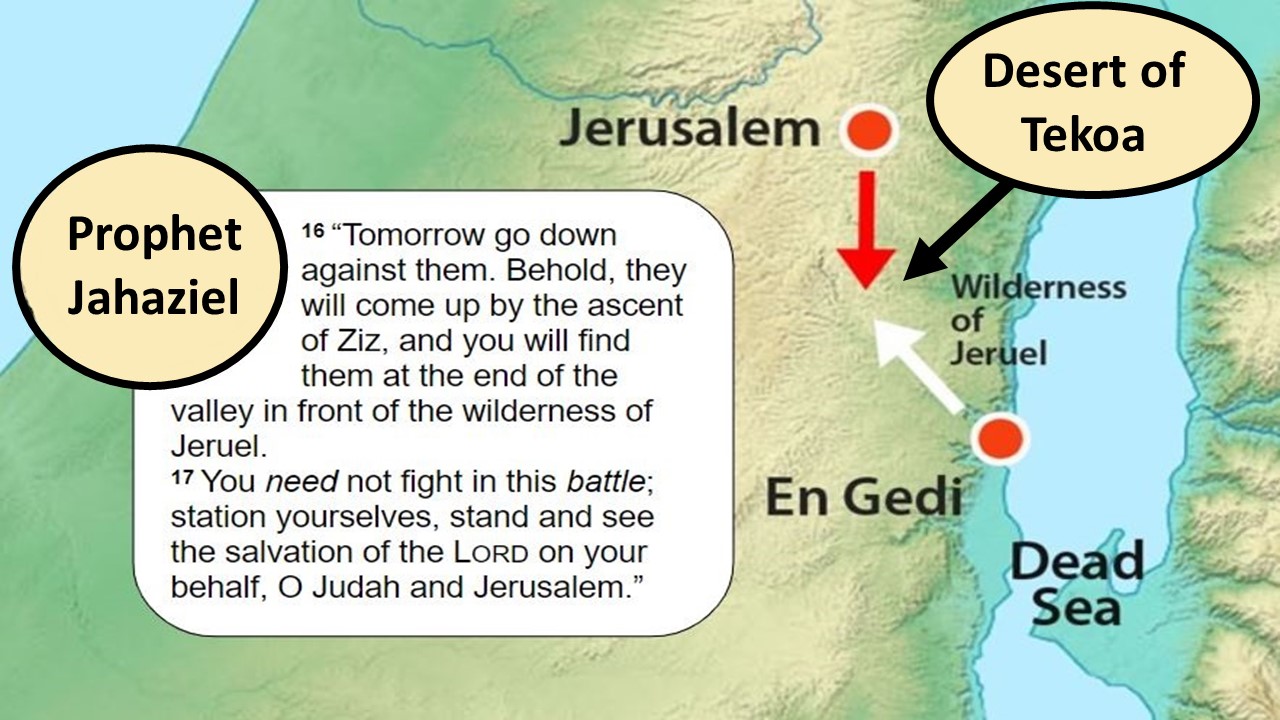
Direction Given by the Prophet Jahaziel: 2 Chronicles 20:14-20
When the prophet spoke, the people believed him, and it turned into a time of worship, with some bowing down with their faces to the ground, and at the same time others standing up to “praise the Lord, the God of Israel, with a very loud shout” (2 Chronicles 20:18-19).
Facing the Armies
The next morning, when the army of Judah went out to face the approaching armies, instead of the bravest warriors assembling in the foremost ranks, it was the choir and musicians. When they began to sing and give praise, the three opposing armies began fighting among themselves, destroying each other, with not a single soldier escaping (2 Chronicles 20:20-24).
The battlefield was not only strewn with dead bodies, but also with so much military equipment, clothing, food, and other valuables, that it took them three days to collect it all (2 Chronicles 20:25).
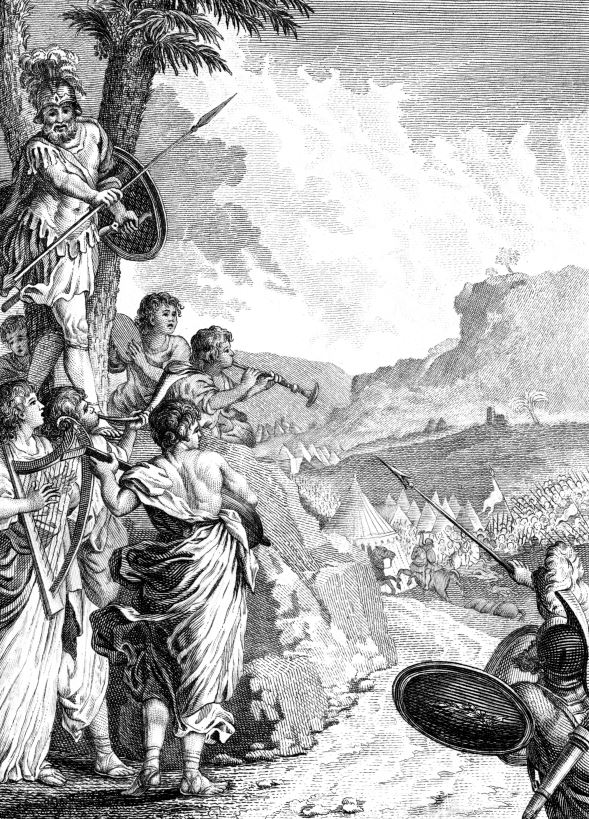
Celebrating the Victory: 2 Chronicles 20:26-28
The Celebration
Upon their return to Jerusalem the celebration was intense, with music of all sorts, singing and dancing. The result of this victory was that the fear of God came over all their enemies, leaving the remaining years of Jehoshaphat’s life in total peace (2 Chronicles 20:27-30).
Sources
1 Kings 22:1-53
2 Kings 3:1-27
2 Chronicles 17:1-19
2 Chronicles 18:1-34
2 Chronicles 19:1-11
2 Chronicles 20:1-37
Return to List of Revival Stories
Chet & Phyllis Swearingen:
Office: (260) 920-8248
romans1015@outlook.com
Beautiful Feet
P.O. Box 915
Auburn, IN 46706

